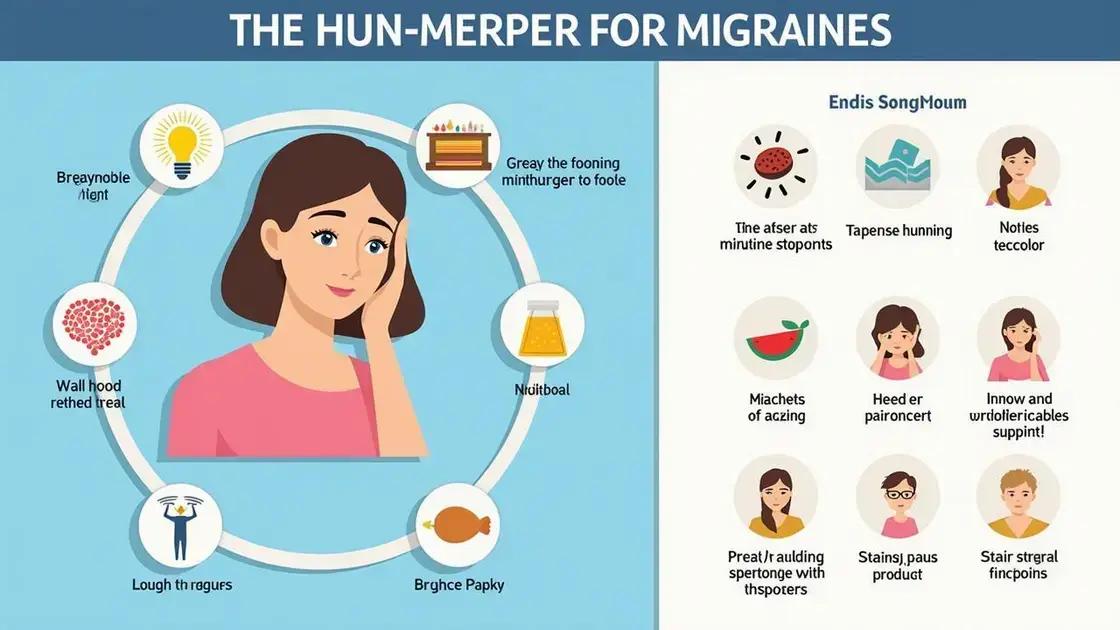To prevent migraines, incorporate dietary changes by avoiding known triggers, maintain a consistent sleep schedule, manage stress through techniques like meditation, stay hydrated, and create a personalized prevention plan that includes regular exercise and monitoring your migraine triggers.
Many people suffer from migraines, which can disrupt daily life. Understanding how to prevent migraines with diet and lifestyle changes is crucial for managing symptoms and improving quality of life. In this article, we will explore the connection between diet and migraines, effective lifestyle modifications you can make, and how to create a personalized plan that works for you. Let’s dive into actionable strategies that can help you reduce the frequency and intensity of your migraines.
Understanding Migraines: Causes and Symptoms

Migraines are intense headaches that can last for hours or even days. They come with various symptoms that significantly affect daily life. Understanding migraines is essential for effective prevention.
Causes of Migraines
Migraines can have multiple triggers, and they affect people differently. Some common causes include:
- Genetics: Family history can play a role in susceptibility to migraines.
- Hormonal changes: Many women experience migraines related to their menstrual cycle.
- Stress: High-stress levels can increase the likelihood of experiencing migraines.
- Certain foods and drinks: Aged cheeses, alcohol, and processed foods may trigger migraines in some individuals.
- Environmental factors: Bright lights, loud noises, and strong smells can also contribute to migraines.
Symptoms of Migraines
Migraines typically present with a variety of symptoms. These can range from moderate to severe and may include:
- Pain: Usually, a one-sided, throbbing pain that lasts for several hours.
- Nausea: Many people feel sick to their stomach during an attack.
- Vomiting: It is common to vomit during severe migraine episodes.
- Sensitivity to light and sound: Many sufferers prefer dark, quiet rooms during an attack.
Recognizing the symptoms early can help in seeking treatment and implementing preventive strategies.
The Role of Diet in Migraine Prevention

Diet plays a crucial role in preventing migraines. Certain foods can act as triggers, while others can help reduce their occurrence. Making wise dietary choices can significantly impact your migraine frequency and severity.
Foods to Avoid
Some foods are known to trigger migraines in many individuals. It is wise to keep a diary of what you eat to identify specific triggers. Common foods to avoid include:
- Aged cheeses: The tyramine in aged cheeses can cause migraines in some people.
- Processed meats: These often contain additives such as nitrates and nitrites, which may trigger headaches.
- Alcohol: Red wine and beer are typical culprits known for triggering migraines.
- Chocolate: Some people report that chocolate can lead to migraine attacks.
- Caffeinated drinks: While caffeine can help some, too much can lead to withdrawal headaches.
Foods to Embrace
Incorporating certain foods can help prevent migraines. Focus on a balanced diet rich in:
- Fruits and vegetables: Foods like leafy greens, berries, and bananas are excellent for overall health.
- Whole grains: Oats, brown rice, and whole wheat bread can keep your energy stable.
- Lean proteins: Chicken, fish, tofu, and legumes support body functions without unnecessary additives.
- Magnesium-rich foods: Almonds, spinach, and avocados are great sources that may help reduce migraines.
Staying hydrated is also important. Dehydration can be a migraine trigger. Aim to drink plenty of water throughout the day. By focusing on a healthy diet, you can potentially reduce the burden of migraines in your life.
Effective Lifestyle Changes to Reduce Migraines

Making effective lifestyle changes can significantly help reduce the frequency and intensity of migraines. Here are some strategies to consider:
Manage Stress
Stress is a major trigger for migraines. Incorporating techniques to manage stress can be very effective. Consider:
- Meditation: Spending just a few minutes a day in meditation can promote relaxation.
- Yoga: This practice combines physical activity and relaxation, helping both the body and mind.
- Deep Breathing Exercises: Taking slow, deep breaths can help reduce stress quickly when you feel overwhelmed.
Regular Sleep Patterns
A consistent sleep routine is vital. Lack of sleep or irregular sleeping hours can trigger migraines. Aim to:
- Go to bed and wake up at the same time every day: Maintaining consistency helps regulate your body’s internal clock.
- Aim for 7-9 hours of sleep: Quality sleep is essential in preventing migraines.
- Create a restful environment: Keep your bedroom dark, cool, and quiet for better sleep quality.
Stay Hydrated
Dehydration can lead to migraine attacks. It’s essential to:
- Drink plenty of water: Aim for at least 8 cups each day, more if you are active.
- Limit caffeinated drinks: While some caffeine can help, excessive intake can lead to dehydration.
Exercise Regularly
Moderate, regular physical activity can decrease the frequency of migraines. Benefits include:
- Endorphin Release: Exercise triggers the release of chemicals in the brain that help relieve pain.
- Weight Management: Keeping a healthy weight can minimize migraine triggers.
- Improved Sleep Quality: Regular exercise also contributes to better sleep patterns.
By focusing on these lifestyle changes, you can create a proactive approach to managing and reducing migraines.
Creating a Personalized Migraine Prevention Plan

Creating a personalized migraine prevention plan can help you manage your migraine triggers effectively. Tailoring your plan involves understanding your unique triggers and setting realistic goals. Here’s how to start:
Identify Your Triggers
The first step in developing your plan is to identify what triggers your migraines. Keep a migraine diary to log:
- Food and Drink: Make notes on what you eat and drink leading up to a migraine.
- Stress Levels: Record your stress levels daily and any significant events.
- Sleep Patterns: Monitor your sleep quality and duration.
- Weather Changes: Pay attention to how weather shifts affect your migraines.
Set Realistic Goals
After identifying triggers, set achievable goals. For instance:
- Aim for Consistent Sleep: Establish a regular sleep schedule.
- Limit Known Triggers: Gradually adjust your diet to avoid foods that trigger migraines.
- Incorporate Relaxation Techniques: Set a goal to practice yoga or meditation several times a week.
Consult a Healthcare Professional
Working with a healthcare professional can enhance your plan. They can provide guidance on:
- Medication: Discuss preventive medications that may help reduce migraine frequency.
- Dietary Guidance: Get expert advice on creating a balanced meal plan.
- Therapies: Explore alternative therapies that may benefit your specific situation, like acupuncture.
Monitor and Adjust
Your personalized plan should be flexible. Continuously monitor its effectiveness by:
- Reassessing Triggers: Update your diary regularly to adjust your goals.
- Tracking Progress: Note any changes in the frequency or intensity of migraines.
- Adjusting Strategies: Be willing to modify your goals and tactics based on what works best for you.
By creating and maintaining a personalized migraine prevention plan, you will be better equipped to manage your migraines and improve your quality of life.
In Summary: Effective Strategies for Migraine Prevention
Preventing migraines involves a comprehensive approach that incorporates diet and lifestyle changes tailored to your needs.
By understanding your triggers, making conscious dietary choices, adopting stress-reduction techniques, and creating a personalized prevention plan, you can significantly reduce the frequency and intensity of migraine attacks.
Consulting with healthcare professionals also plays a vital role in managing migraines effectively and ensuring you have the best strategies in place.
Ultimately, taking control of your migraine health can lead to a better quality of life and less impact on your daily activities.
FAQ – Frequently Asked Questions About Migraine Prevention
What dietary changes can help prevent migraines?
Incorporating a diet rich in fruits, vegetables, whole grains, and lean proteins while avoiding known triggers like aged cheeses and processed meats can help.
How can stress management reduce migraines?
Techniques such as meditation, yoga, and deep breathing exercises can help lower stress levels, which is a common migraine trigger.
Why is a consistent sleep schedule important for migraine prevention?
A regular sleep routine helps regulate your body’s internal clock, reducing the risk of sleep-related migraine triggers.
How does hydration affect migraines?
Staying properly hydrated can help prevent migraines, as dehydration is a known trigger for many individuals.
What should I include in a personalized migraine prevention plan?
Identify your triggers, set realistic goals for dietary and lifestyle changes, seek professional advice, and regularly monitor your progress.
Can exercise help reduce migraines?
Regular moderate exercise can lower migraine frequency by promoting overall health, reducing stress, and improving sleep quality.












